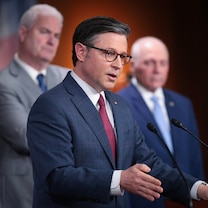Egyptian 'Coup' Dissolves Parliament
Ruling military council throws transition into doubt.
CAIRO June 14, 2012— -- In the final days before this weekend's landmark presidential run-off election, Thursday brought a pair of decisions that threw Egypt's fledgling democracy into doubt.
Egypt's Supreme Constitutional Court ruled that one third of the Muslim Brotherhood-led Parliament must be immediately dissolved. The Supreme Council of the Armed Forces, the country's ruling military, quickly declared full legislative authority, saying that if a portion of the parliament was unconstitutional, that rendered the entire parliament unconstitutional.
"We saw a coup in Egypt today," said Shadi Hamid, director of research at the Brookings Doha Center. "It was an all out power grab. The regime's apparatus is going into full force. And so far, it's a remarkable and successful coup."
In the second ruling, the Mubarak-appointed judges voted that Ahmed Shafiq, Egypt's last prime minister during the revolution, will be allowed to remain on the ballot in the run-off presidential election against the head of the Muslim Brotherhood, Mohammed Morsi, scheduled for June 16 and 17.
"All this equals a complete coup d'etat through which the military council is writing off the most noble stage in the nation's history," Mohamed el-Beltagy, a senior member of Morsi's Freedom and Justice Party, wrote on his Facebook wall. "This is the Egypt which Shafiq and the military council desire."
Shortly after the rulings were handed down, Shafiq gave a press conference that looked and sounded much like a victory speech. Shafiq told a cheering crowd, "I don't want power, I want to lead Egypt with your help."
In his speech, Shafiq, a close friend of Mubarak's, described a modern, free Egypt where every individual has a vote, promising sweeping reforms. "We love you, President Shafiq," the crowd chanted in response.
Former International Atomic Energy Agency chief and presidential hopeful, Mohamed el-Baradei warned that Egypt is entering a dangerous phase.
"Electing a president without having a constitution or parliament means electing a president with absolute power," el-Baradei said. Still popular with youth leaders, el-Baradei dropped out of the presidential race in January, saying the democratic electoral process was doomed under SCAF's leadership.
After winning 46% of seats in the recent parliament elections, the Muslim Brotherhood stands to lose the most from today's rulings, and many wondered whether Morsi would still run this weekend.
The Council on Foreign Relations' Steven Cook described two camps arising out of today's decisions: "Those [Muslim Brotherhood members] that believe Egypt is still within their grasp, and those [Muslim Brotherhood members] that are more reluctant to continue the fight, reluctant to run at all."
But former presidential candidate Abul Monem Abul Fotouh said Egyptians were up for the fight, calling today "a complete coup, and anyone who thinks that millions of youth will let it pass is dreaming."
Michael Hanna, an Egyptian-American analyst at the Century Foundation, doubts that young revolutionaries will eagerly take up Morsi's cause.
"There is still a huge gulf of mistrust between the Muslim Brotherhood and the revolutionaries which presents a real stumbling block," he said. Whether Egyptians channel their outrage to the voting booths, or to the street is yet to be seen and the real test will come after Friday prayers.
Today's rulings follow Wednesday's harsh Justice Ministry decree that granted the military council authority to arrest civilians. The legal combination leaves SCAF squarely at the helm for the foreseeable future, said Hamid.
"SCAF has outmaneuvered everyone, and it has been masterful," he said.
The Muslim Brotherhood said that a Shafiq victory this weekend would effectively wipe out the democratic progress made since the revolution, handing power right back to the felool, ("remnants of the old regime"). Shafiq's rise to prominence confirms the activists' worst fears: despite their days and nights spent in Tahrir, power has not changed hands.
In an evening statement, the Brotherhood warned of "very difficult days that might be more dangerous than the last days of Mubarak's rule."




